Tuesday, May 15th 2012

AMD Launches the Second-Generation A-Series APUs
AMD today announced the widely anticipated launch of its 2nd-Generation AMD A-Series Accelerated Processing Units (APUs) for mainstream and ultrathin notebooks, All-in-One and traditional desktops, home theater PCs and embedded designs.
The 2nd-Generation A-Series APU, codenamed "Trinity", is a grounds-up improved design over the previous generation, enabling a best-in-class PC mobility, entertainment, and gaming experience. New features of the product design include:
● Double the performance per watt of the previous generation;
● The AMD HD Media Accelerator with a unique set of technologies designed to optimize video quality available with premium and Internet video content, and accelerate video file conversion;
● An increase in CPU performance of up to 29 percent with higher processor speeds thanks to the next-generation AMD "Piledriver" CPU core with 3rd-Generation AMD Turbo Core technology, where power is dynamically shifted between the CPU and GPU depending on application needs, effectively providing a more responsive experience that can boost CPU frequencies to up to 3.2 GHz;● AMD Radeon HD 7000 Series graphics for an increase of graphics performance up to 56% over the previous generation. Combined, the CPU and GPU cores deliver more than 700 gigaflops of computing performance - several times more than the fastest x86 CPUs - to boost performance of hundreds of applications;
● Up to 12 hours of battery life through CPU and GPU power enhancements, with clear battery life leadership in notebook form factors.
"The latest OEM notebooks, ultrathins, All-in-Ones and desktops based on the new AMD A-Series APU enable the best video and gaming experiences, highly responsive performance with AMD Turbo CORE, and accelerate an ever-increasing range of productivity and multimedia applications -- in sleek, stylish designs at price points that make sense," said Chris Cloran, corporate vice president and General Manager, AMD Client Business Unit. "Our 2nd-Generation AMD A-Series APU is a major step forward in every performance and power dimension, allowing users to enjoy a stunning experience without having to give up the things that matter to them most. This experience doesn't stop at mainstream notebooks. It carries over into affordable ultrathin form factors featuring the latest in AMD Radeon graphics."
The Growing AMD Accelerated Application Ecosystem
The developer ecosystem continues to gravitate to the unmatched level of compute and unique processing capabilities of the APU as more than 100 applications and games are now accelerated by AMD APUs. The 2nd-Generation AMD A-Series APU gives users superior Web-based video experience thanks to plug-ins for Google Chrome, Firefox and Internet Explorer 9 that make it easy for consumers to turn on AMD Steady Video technology. Recent applications that have been optimized for use on AMD A-Series APUs include Adobe Photoshop CS6, WinZip 16.5 and VLC Media Player. AMD A-Series APUs are also well-positioned to take advantage of the upcoming transition to the Windows 8 operating system.
"We are excited for the introduction of the 2nd-Generation AMD A-Series APU and are confident it will continue the great work Microsoft and AMD have done together on the A-Series APU," said Aidan Marcuss, senior director, Windows Business Planning, Microsoft Corp. "We look forward to seeing the A-Series APU in action with Windows 8 to deliver a great user experience across a variety of hardware."
For developers who want to engage in the industry's move toward heterogeneous computing, the upcoming AMD Fusion Developer Summit will offer them a unique opportunity to enhance their knowledge base. More information on AFDS can be found here.
Unmatched Mobility
With more than 12 hours of 'resting' battery life, AMD is now an industry leader in notebook battery-life performance. The 2nd-Generation AMD A-Series APU delivers increased levels of performance, while consuming half the power as its predecessor.
These gains can be attributed to the new power-optimized "Piledriver" CPU core, as well as to AMD Start Now technology, which is designed to maximize system responsiveness by quickly entering and exiting low power states. With AMD Start Now, the computer resumes from sleep mode in as few as two seconds and boots to the desktop in as few as 10 seconds.
In ultrathin form factors, AMD enables an uncompromised visual experience thanks to a power-efficient and premium AMD Radeon graphics engine. Consumers can expect to see ultrathin notebooks based on dual-core 17-watt and quad-core 25-watt AMD A-Series APUs. These products will be easily identifiable by aluminum-styled VISION Technology stickers at a range of competitive price points.
Best-in-class Entertainment
As more and more people turn to their computers as the hub for their entertainment, the visual aspect of computing becomes ever more important. To enhance these capabilities, AMD created the AMD HD Media Accelerator - a unique set of technologies that enable the best video quality on a PC. Key features of the HD Media Accelerator include:
● AMD Perfect Picture HD - An image, video processing and display technology that automatically makes images and video better with color vibrancy adjustments, edge enhancement, noise reduction and dynamic contrast fixes;
● AMD Steady Video Technology - A technology that enables smooth playback of jittery video content with a single button click thanks to plug-ins for popular Web browsers and multimedia applications;
● AMD Quick Stream Technology - A new technology that prioritizes video streaming on PC systems for a smooth, virtually uninterrupted video stream;
● True HD video chat with up to four people at once;
● AMD Video Converter - A video compression engine for fast conversion and sharing of media files across multiple formats and devices;
● Full decode support for H.264, MPEG-2, VC-1, MVC, DivX and WMV.
Gaming Leadership
The 2nd-Generation AMD A-Series APU builds on AMD's legacy of gaming leadership with an increase in graphics performance of up to 56% over the previous generation and support for:
● AMD Eyefinity Technology - For the first time, this immersive technology is available from an APU without the need for a discrete graphics card;
● Performance-leading DirectX 11 graphics architecture and 1080p gaming a life-like level of detail;
● AMD Radeon dual graphics support that delivers a performance boost of up to 75 percent when adding a discrete graphics card to the APU. The AMD Radeon dual graphics option also offers support for DirectX 9 for older game titles, and uses new AMD CrossFire Technology Profiles for easier updates.
Availability and Technical Details
AMD has a record number of design wins with companies like Acer, Asus, HP, Lenovo, Samsung, Sony and Toshiba based on our 2nd-Generation AMD A-Series APUs and VISION Technology from AMD, with mainstream and ultrathin notebooks as well as embedded solutions, available beginning today.Desktops systems and component channel parts will be available later this year.
The 2nd-Generation A-Series APU, codenamed "Trinity", is a grounds-up improved design over the previous generation, enabling a best-in-class PC mobility, entertainment, and gaming experience. New features of the product design include:
● Double the performance per watt of the previous generation;
● The AMD HD Media Accelerator with a unique set of technologies designed to optimize video quality available with premium and Internet video content, and accelerate video file conversion;
● An increase in CPU performance of up to 29 percent with higher processor speeds thanks to the next-generation AMD "Piledriver" CPU core with 3rd-Generation AMD Turbo Core technology, where power is dynamically shifted between the CPU and GPU depending on application needs, effectively providing a more responsive experience that can boost CPU frequencies to up to 3.2 GHz;● AMD Radeon HD 7000 Series graphics for an increase of graphics performance up to 56% over the previous generation. Combined, the CPU and GPU cores deliver more than 700 gigaflops of computing performance - several times more than the fastest x86 CPUs - to boost performance of hundreds of applications;
● Up to 12 hours of battery life through CPU and GPU power enhancements, with clear battery life leadership in notebook form factors.
"The latest OEM notebooks, ultrathins, All-in-Ones and desktops based on the new AMD A-Series APU enable the best video and gaming experiences, highly responsive performance with AMD Turbo CORE, and accelerate an ever-increasing range of productivity and multimedia applications -- in sleek, stylish designs at price points that make sense," said Chris Cloran, corporate vice president and General Manager, AMD Client Business Unit. "Our 2nd-Generation AMD A-Series APU is a major step forward in every performance and power dimension, allowing users to enjoy a stunning experience without having to give up the things that matter to them most. This experience doesn't stop at mainstream notebooks. It carries over into affordable ultrathin form factors featuring the latest in AMD Radeon graphics."
The Growing AMD Accelerated Application Ecosystem
The developer ecosystem continues to gravitate to the unmatched level of compute and unique processing capabilities of the APU as more than 100 applications and games are now accelerated by AMD APUs. The 2nd-Generation AMD A-Series APU gives users superior Web-based video experience thanks to plug-ins for Google Chrome, Firefox and Internet Explorer 9 that make it easy for consumers to turn on AMD Steady Video technology. Recent applications that have been optimized for use on AMD A-Series APUs include Adobe Photoshop CS6, WinZip 16.5 and VLC Media Player. AMD A-Series APUs are also well-positioned to take advantage of the upcoming transition to the Windows 8 operating system.
"We are excited for the introduction of the 2nd-Generation AMD A-Series APU and are confident it will continue the great work Microsoft and AMD have done together on the A-Series APU," said Aidan Marcuss, senior director, Windows Business Planning, Microsoft Corp. "We look forward to seeing the A-Series APU in action with Windows 8 to deliver a great user experience across a variety of hardware."
For developers who want to engage in the industry's move toward heterogeneous computing, the upcoming AMD Fusion Developer Summit will offer them a unique opportunity to enhance their knowledge base. More information on AFDS can be found here.
Unmatched Mobility
With more than 12 hours of 'resting' battery life, AMD is now an industry leader in notebook battery-life performance. The 2nd-Generation AMD A-Series APU delivers increased levels of performance, while consuming half the power as its predecessor.
These gains can be attributed to the new power-optimized "Piledriver" CPU core, as well as to AMD Start Now technology, which is designed to maximize system responsiveness by quickly entering and exiting low power states. With AMD Start Now, the computer resumes from sleep mode in as few as two seconds and boots to the desktop in as few as 10 seconds.
In ultrathin form factors, AMD enables an uncompromised visual experience thanks to a power-efficient and premium AMD Radeon graphics engine. Consumers can expect to see ultrathin notebooks based on dual-core 17-watt and quad-core 25-watt AMD A-Series APUs. These products will be easily identifiable by aluminum-styled VISION Technology stickers at a range of competitive price points.
Best-in-class Entertainment
As more and more people turn to their computers as the hub for their entertainment, the visual aspect of computing becomes ever more important. To enhance these capabilities, AMD created the AMD HD Media Accelerator - a unique set of technologies that enable the best video quality on a PC. Key features of the HD Media Accelerator include:
● AMD Perfect Picture HD - An image, video processing and display technology that automatically makes images and video better with color vibrancy adjustments, edge enhancement, noise reduction and dynamic contrast fixes;
● AMD Steady Video Technology - A technology that enables smooth playback of jittery video content with a single button click thanks to plug-ins for popular Web browsers and multimedia applications;
● AMD Quick Stream Technology - A new technology that prioritizes video streaming on PC systems for a smooth, virtually uninterrupted video stream;
● True HD video chat with up to four people at once;
● AMD Video Converter - A video compression engine for fast conversion and sharing of media files across multiple formats and devices;
● Full decode support for H.264, MPEG-2, VC-1, MVC, DivX and WMV.
Gaming Leadership
The 2nd-Generation AMD A-Series APU builds on AMD's legacy of gaming leadership with an increase in graphics performance of up to 56% over the previous generation and support for:
● AMD Eyefinity Technology - For the first time, this immersive technology is available from an APU without the need for a discrete graphics card;
● Performance-leading DirectX 11 graphics architecture and 1080p gaming a life-like level of detail;
● AMD Radeon dual graphics support that delivers a performance boost of up to 75 percent when adding a discrete graphics card to the APU. The AMD Radeon dual graphics option also offers support for DirectX 9 for older game titles, and uses new AMD CrossFire Technology Profiles for easier updates.
Availability and Technical Details
AMD has a record number of design wins with companies like Acer, Asus, HP, Lenovo, Samsung, Sony and Toshiba based on our 2nd-Generation AMD A-Series APUs and VISION Technology from AMD, with mainstream and ultrathin notebooks as well as embedded solutions, available beginning today.Desktops systems and component channel parts will be available later this year.
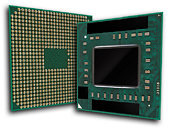
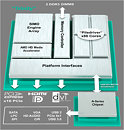
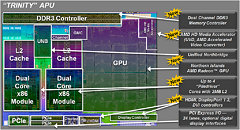
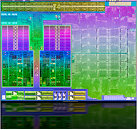
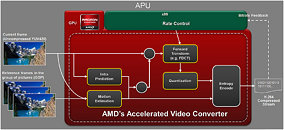
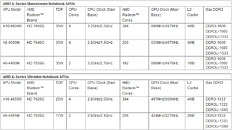
40 Comments on AMD Launches the Second-Generation A-Series APUs
Check the reviews again.
The only place where Trinity scores outright win is 3D Mark and 1 or 2 games. Despite AMD's chip being a GPU based chip, it doesn't make that big an impact as Llano did last year.
Check the ANANDTech review will you
hothardware.com/Reviews/AMD-Trinity-A104600M-Processor-Review/?page=1So, if you spend 18% more your positive you'll gain 18% more gaming performance and that translate to a "seat of the pants" worth. Doubtful.
But I don't want to enter a discussion like in a previous Trinity related thread. In that one I said the GPU would be at most 20% faster in average at that¡s what it is and same for the CPU. As always realty is far far far from AMD's marketing numbers. 29% CPU (productivity) and 56% GPU... sure.
PS: Fun to see it's the exact same people as in the other thread defending Trinity, as if it were the second coming. AndreiD is just speaking the truth, Trinity is barely a decent evolution over Llano and hardly impressive in any way. It belongs to the $500 laptop segment where it could be somewhat successful and that's it. Below and above that price range Intel simply owns.
That it cleanly beats SB i3's as well in CPU, and obliterates it in GPU, while consuming the same power, and occupying the same price range... umm.. yeah. Little bit behind an i5 on CPU, faster in GPU, still same TDP, $100 less. Okay. Oh, and for $50 more on top of that you can add a GPU which will double your power consumption i.e. make your battery last half as long if you are going to use it, heat your laptop up more, and you'll only see at most a 20% higher gaming performance... for :O 20% higher cost... yeah great deal. Oh, and at higher resolution and detail settings the difference is smaller in performance and all too.
AMD is now in the advantage in low cost systems and ultrathins, if for the reason they're affordable ultrathins and therfore easier to market and sell to an average person. Laptop wise they beat the i3's in their price range in every concieveable way and compete with more expensive i5 systems so... yeah...
"Trinity showed a decisive lead on the order of 30 - 50+% over Intel's HD 4000 integrated graphics in the Ivy Bridge Core i7 chip we pit it against."
Sure against mature SB with discrete the current pricing is still askew, and probably will be because Intel is probably saturating the market with price conscience budget books with discrete to keep a thumb on Trinity till they make a move with more IB's a HD4000 for mobiles. I'll wait to pass any judgment on prices till we see some true OEM offerings to match it up against.
Here's another review with a i5's with discrete but XPS and ASUS N55SF which aren't $600-700 laptop either... They're saying "It takes a mid-class GeForce GT 555M mGPU to outdistance the performance exhibited by Trinity's integrated graphics."
hexus.net/tech/reviews/cpu/39333-amd-a10-4600m-trinity-apu/
and remember the i5 has turbo up to 2.9ghz so there is no way trinity can beat that with 3.2. but it sure closes the gap as llano was up to 2.4ghz
at 2,4ghz the i5 in single thread is more than twice as fast as llano, but now were talking about 25-30% which if you ask me is pretty impressive as its a step forward however it sure wont take intel out of the game and amd never claimed to do so
and with the accelerated apps trinity can sometimes beat intel but in general it matches it
i think the 29% marketing is rather much more accurate than any previous amd marketing ive seen
uk.hardware.info/reviews/2735/9/amd-a10-trinity-apu-reviewed-benchmarksn3dmark06--vantage--11
that looks like 50% increase to me
and you know very well that when you wanna test graphic cards you use high settings and usualy the same bench system, in this case it itsnt like that, intel has a cpu advantage which enhances fps, especialy in low settings thats exactly when the cpu does more work, if you put higher settings it will get more gpu dependant. im sure thats were the gap will get bigger and you will see something closer to 50%
also higher resolutions change things up. i would wait for retail laptops to show up then things will be more realistic
not to mention these are the first batch of trinity chips, we can always expect future models with higher clocks at the same tdp that also will be interesting
overall AMD is still very much in the game and thats the good news, no1 said or even expected that trinity will knock intel out, but it sure will compete in price, even if an amd apu is priced the same as a more powerful intel cpu the amd will still perform better in gaming and graphical tasks, the intel computer would require a discrete gpu to compete, and thats were these apus can be cost affective
ever since llano, AMD has had the graphics advantage over intel, even with similarly priced laptops, amd always had the better graphics either because intel had no discrete, or because when intel has a discrete gpu then that price range allows the amd rig to have other upgraded features like a second gpu or so
here is an interesting read
news.softpedia.com/news/AMD-Trinity-Trounces-Ivy-Bridge-in-Diablo-III-270029.shtml
note that amd is 40-48% faster despite having much slower x86cores, now compare the trinity to a mid range i5 with hd4000 and the difference will get even bigger
So on Trinity:
I said it already, Trinity GPU is faster than Intel offerings, no one ever denied that, but it's not so much faster anymore and it certinly does not deliver on it's promises of being 56%. For the very very limited amount of people who want to game but do not have any performance and/or quality standards (no dedicated GPU), Trinity is obviously better, but for the grand majority of those people Ivy Bridge GPU is probably just as good. So it's just about emphasis, do you want 50% faster CPU or up to 50% faster GPU. Most people will benefit more from the CPU, while gamers will benefit much much more by getting a laptop with a dedicated GPU. Trinity is on average 25% faster than Ivy Bridge, a dedicated GPU will get you 200%, 300% and even 500% more performance, the scale is way out here, 25% difference is nothing in comparison, especially if you are going to play at 720p anyway (you have really low standards).
And that's it, for non-gamers which is 90% of people the faster CPU wins hands down and that's Ivy Bridge, and if it's anything like SB vs Llano, it's going to be actually cheaper than comparable Trinity laptops as long as they are iGPU based.
In the other 10%, 8% will benefit from ANY modern (modern defined as contemporary to Trinity) dedicated GPU with only a small $50-100 increase in price and will get performance that is 5x higher. That is they will get actually playable performance. And honestly, to me, people who want to game but are not willing to pay $50 or $100 more have a name, PIRATES. There's no way you are going to cheap out $50 when that will give you 3x more gaming performance if you actually are a gamer and thus spend $100-$200 in games. No way, there's no logic there.
So what's left for Trinity? A 2%? Yes, a 2% where it is clearly superior. For the rest it has a chance of snatching a sizable portion of the 90% of people for which nearly anything is "enough", but for that they have to price them in the $500 range, because in that range there's plenty of i3 and some i5 that will cream Trinity in efficiency. SandyB i3's and i5's can be had for cheaper than A8 and even some A6 based laptops so it's like I said, at $500 it has an oportunity and that's it. If you don't like it because you are such an AMD fan (or employee), sorry to hear that. End of story.
bla bla bla bla bla we all know ya wrong go have alook at reviews hell the one above will do^
anyone that uses ANANDTech for reviews is a moron its so bi-est it isnt funny.
Bla bla bla again we all know Trinity beats sandy and ivy (GPU) wise hell even the old APU's beat ivy?
Are you happy now???
your waffle of this being underwelming is largely irelivant as your type wouldnt even look at one in reality anyway.
I built a K3870 + Hd6670 pc for my uncle , who was on his way to PC world to get slapped to the tune of 600 ukp for an i3 based Hd3000 intel system, he spent 450 with my help, tho he gave me thirty quid hes still up, and my cousins, his sons are beside themself with joy aged 10-14, it plays any game they want on medium settings with no issues and looks smooth and pretty ( i obv loaded some games for em and tried them, and i didnt OC it(ive learned its not worth the phonecalls) all in shh,,,, you know nowt , fuck figures try one then know , not guess how they play games.
trinity with + 20% cpu performance , plus the extra gpu oomph is well worth a look to Anybody looking to buy a mobile ,light gameing platform
semiaccurate.com/2012/05/17/is-amds-trinity-much-better-than-it-appears/ is Amd's trinity better then first appears
editorial but worth a read, looking forward to q3-4:)
heck even if you are using photoshop, ive used photoshop on a phenom II 955 and on an I5 2500k and honostly i hardly notice any experience difference, however when i use my llano a6 T 1.4ghz-2.3ghz it does get a bit laggy sometimes but overclocking with k10stats gets it were it should be in my case, however my point is you only need a certain amount of cpu grunt to be good all around and it seems trinity definitely meets that requirement and is almost the sweetspot in mobile cpu performance, and with added opencl support for cs6 thats even better news for me XD
in graphics however it is always noticeable when u get low fps, bad image quality and so on because it is something "visual" that you can see